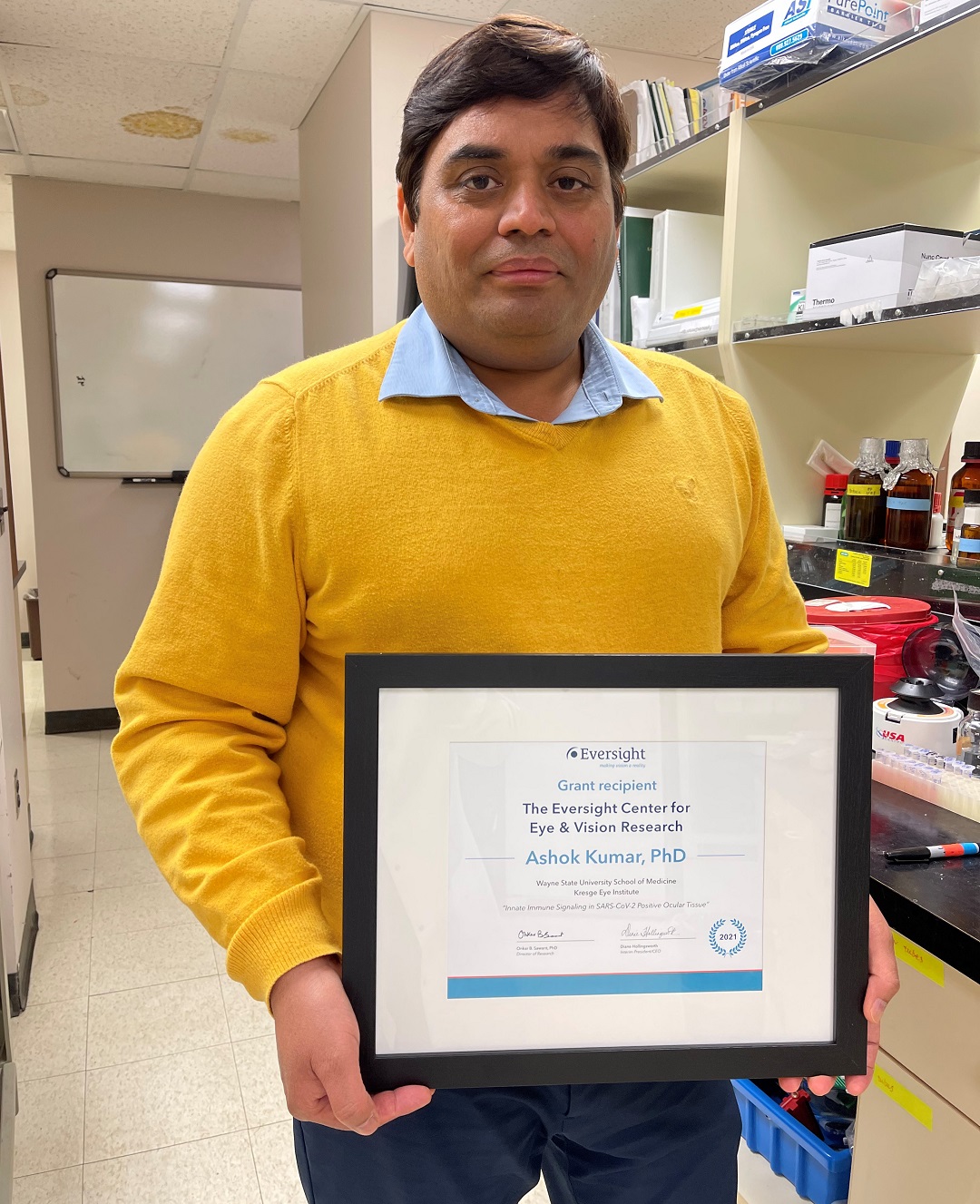Ashok Kumar, Ph.D., associate professor of Ophthalmology, Visual and Anatomical Sciences at the Wayne State University School of Medicine, has been awarded a grant through the Eversight Center for Vision and Eye Banking Research to advance his promising ophthalmic research.

Dr. Kumar is investigating whether ocular surface epithelial cells are susceptible to SARS-CoV-2 infection. His study could help fill a knowledge gap at the intersection of COVID-19, ophthalmology and public health.
“I would like to thank Eversight for not only providing the funding for the project but also ocular tissue from COVID-19 donors,” Dr. Kumar said. "Our recent study in collaboration with Eversight showed the presence of SARS-CoV-2 viral RNA and its spike and envelope proteins in the cornea of COVID-19 patients.”
The report, “Prevalence of SARS-CoV-2 in human post-mortem ocular tissues,” was published in The Ocular Surface’s January 2021 issue.
“In the proposed study, we will move one step further and test whether live SARS-CoV-2 virus can infect cells at the ocular surface,” he added. “The COVID-19 pandemic is a public health emergency and being a microbiologist, it is my professional responsibility to contribute the scientific knowledge needed in understanding the biology of this virus that can eventually lead to drug development. Since 2016, our laboratory has been working on Zika virus, which shares some similarity with SARS-CoV-2 in being a positive-strand RNA virus. We leveraged that knowledge and initiated this project to investigate ocular complications of COVID-19. This pilot funding from Eversight will help in generating preliminary data to seek funding from the National Institutes of Health and allow us to continue this much-needed research of national and international importance.”
Dr. Kumar is one of five grant recipients selected by an independent review panel of academic researchers and ophthalmologists.
“Dr. Kumar’s studies of COVID-19 in the eye will elucidate and fill gaps in our knowledge base, which will be essential to development of novel treatments for patients,” said School of Medicine Vice Dean of Research, Linda Hazlett, Ph.D.
Proposals selected for funding align with Eversight’s mission to restore sight and prevent blindness through meaningful scientific inquisition.
“The applicant pool once again demonstrated scientific curiosity and academic integrity that continues to impress our review panel each funding cycle,” said Onkar Sawant, Ph.D., Eversight director of Research and Innovations. “The Eversight Center for Vision and Eye Banking Research remains dedicated to supporting our partners’ foundational ocular investigations. We look forward to the findings of these five projects and how they might expand our current knowledge of Fuchs dystrophy, dry eye, graft rejection and more.”
Eversight is a nonprofit organization with a mission to restore sight and prevent blindness through donation, transplantation and research. The Eversight network is responsible for recovering, evaluating and providing human eye tissue for transplantation; supporting research into the causes and cures of blinding eye conditions; promoting donation awareness through public and professional education; and providing humanitarian aid to people around the world in need of corneal transplantation.
Operating in Connecticut, Illinois, Michigan, New Jersey, Ohio and South Korea, Eversight works in collaboration with surgeons, researchers, academic medical centers and eye banks across the United States and abroad.
“Dr. Kumar is a preeminent viral researcher. In this time of the pandemic, it is critical to understand COVID-19 and the virus, and Dr. Kumar's work helps to achieve this scientific goal,” said Mark Juzych, M.D., professor and chair of the Department of Ophthalmology, Visual and Anatomical Sciences, and director of the Kresge Eye Institute.